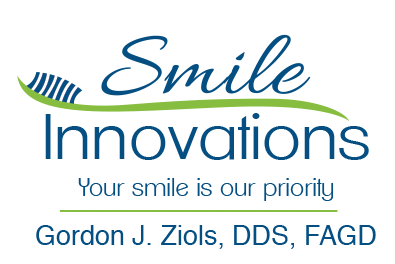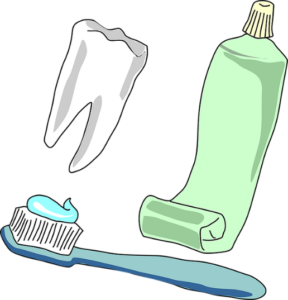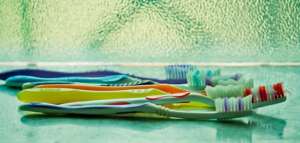Family Dentist in Chicago
 Do you suffer from regular sensitivity? Teeth sensitivity is often misunderstood, but our dental team can help you find relief. We’re here to separate the fact from fiction in sensitivity.
Do you suffer from regular sensitivity? Teeth sensitivity is often misunderstood, but our dental team can help you find relief. We’re here to separate the fact from fiction in sensitivity.
MYTH: People’s teeth are supposed to hurt when they bite into cold or hot foods.
Feelings of sensitivity when eating hot or cold foods should not be a typical experience. If you suffer from hypersensitivity, it can actually be a sign that something is wrong. There are many causes for hypersensitivity including cavities, older dental fillings, worn tooth enamel, gum disease, and exposed tooth roots. Dentin hypersensitivity is a common issue. A visit to our dental office can help you find relief.
MYTH: Desensitizing toothpastes are not effective in reducing teeth sensitivity.
Desensitizing toothpastes include compounds like potassium nitrate or strontium chloride. These ingredients work by preventing pain signals being transmitted between the surface of your tooth and the inside nerves. It may take several applications of the toothpaste until you will feel a noticeable difference. Prescription strength toothpastes are also an option for more severe and prolonged feelings of sensitivity. Ask our dentist to recommend a toothpaste for your needs.
MYTH: You shouldn’t drink coffee or eat ice cream if you have sensitive teeth.
You don’t have to be limited from eating or drinking your favorite foods. It is important to check with our dentist to determine the root cause of your discomfort. Based on your cause, we may recommend a prescribed toothpaste or another treatment. You should always maintain proper oral care to prevent sensitivity.
MYTH: Sensitivity never results in tooth loss.
Sensitivity may in fact be a precursor to tooth loss. Gum recession, which exposes the roots of your teeth, can cause general sensitivity among several teeth at the same time. Prolonged and untreated gum recession can lead to tooth loss. Tooth decay can also cause sensitivity. When left untreated, it may lead to an infection in the gums or jaw and risk spreading to other areas in the head or neck. Early diagnosis and treatment can make a difference in keeping your smile healthy.
MYTH: Sensitivity does not have a cure.
Depending on the cause, there are many ways to treat teeth sensitivity. Proper oral hygiene is the best way to prevent any sensitive tooth pain. If you experience sensitivity, schedule a comprehensive dental examination today.
We look forward to seeing you. Contact our team to schedule your next visit.


 Did you know your oral health can impact your overall health? We’ve compiled a list of 5 tidbits about your teeth and oral health.
Did you know your oral health can impact your overall health? We’ve compiled a list of 5 tidbits about your teeth and oral health.  X-rays provide useful visual data for dentists to utilize when treating you. Occasionally, guests to our office ask about the radiation from x-rays and the dangers associated with high-exposure. Rest assured, a dental x-ray is one of the safest medical imaging procedures there is. Here’s what you need to know about getting a dental x-ray.
X-rays provide useful visual data for dentists to utilize when treating you. Occasionally, guests to our office ask about the radiation from x-rays and the dangers associated with high-exposure. Rest assured, a dental x-ray is one of the safest medical imaging procedures there is. Here’s what you need to know about getting a dental x-ray. Before, during, and after cancer treatment it is necessary to keep up with your oral health routine. Cancer and cancer treatments can impact your mouth, so talk to our dentist about your specific treatment and what you can do to keep up with your oral health. Here are a few points to consider.
Before, during, and after cancer treatment it is necessary to keep up with your oral health routine. Cancer and cancer treatments can impact your mouth, so talk to our dentist about your specific treatment and what you can do to keep up with your oral health. Here are a few points to consider. Occasionally you might find yourself in a situation where you won’t be able to brush your teeth, perhaps through a lack of time or your location. Though it is vital to brush twice each day, here are a few steps you can take if you find yourself in a bind.
Occasionally you might find yourself in a situation where you won’t be able to brush your teeth, perhaps through a lack of time or your location. Though it is vital to brush twice each day, here are a few steps you can take if you find yourself in a bind. Taking care of your dentures can seem like an added chore. Don’t worry, with a little effort your dentures can stay clean. Here are 5 tips for keeping your dentures clean and your smile healthy.
Taking care of your dentures can seem like an added chore. Don’t worry, with a little effort your dentures can stay clean. Here are 5 tips for keeping your dentures clean and your smile healthy. Our dentist might suggest dental sealants for your child during a visit to our office. Sealants are a way to protect your teeth against decay. With any dental treatment, it helps to understand the procedure and how it can impact your child’s oral health.
Our dentist might suggest dental sealants for your child during a visit to our office. Sealants are a way to protect your teeth against decay. With any dental treatment, it helps to understand the procedure and how it can impact your child’s oral health. If you are a mother who is breastfeeding your baby, there are several important points to be aware of regarding your baby’s teeth. We suggest you talk with your doctor about your plans on feeding your baby, but there are some known benefits of breastfeeding. According to the U.S. Department of Health and Human Services, breastfeeding can help reduce a child’s risk of developing asthma, diabetes, obesity, ear infections, sudden infant death syndrome, and other disorders, but it also affects your child’s teeth – here’s how:
If you are a mother who is breastfeeding your baby, there are several important points to be aware of regarding your baby’s teeth. We suggest you talk with your doctor about your plans on feeding your baby, but there are some known benefits of breastfeeding. According to the U.S. Department of Health and Human Services, breastfeeding can help reduce a child’s risk of developing asthma, diabetes, obesity, ear infections, sudden infant death syndrome, and other disorders, but it also affects your child’s teeth – here’s how: Calcium is an important mineral for building strong, healthy teeth, but not everyone can tolerate the lactose found in dairy. Lactose is a sugar found in milk and other dairy products. About 65% of people have reduced ability to process lactose past infancy.
Calcium is an important mineral for building strong, healthy teeth, but not everyone can tolerate the lactose found in dairy. Lactose is a sugar found in milk and other dairy products. About 65% of people have reduced ability to process lactose past infancy. Our convenient local dental office is featuring children’s dentistry services for families in our community. The American Dental Association recommends that all patients follow a routine of dental examinations at least every six months, or as directed by their dentist. This is particularly important for growing children.
Our convenient local dental office is featuring children’s dentistry services for families in our community. The American Dental Association recommends that all patients follow a routine of dental examinations at least every six months, or as directed by their dentist. This is particularly important for growing children.